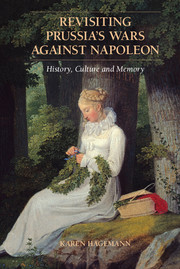Book contents
- Frontmatter
- Epigraph
- Contents
- List of Figures and Maps
- List of Abbreviations
- Acknowledgments
- Revisiting Prussia’s Wars against Napoleon
- Part One A History of Defeat, Crisis and Victory
- Part Two Discourses on the Nation, War and Gender
- 4 Mobilizing Public Opinion
- 5 Defining the Nation
- 6 Debating War
- 7 Regulating Participation
- Conclusion
- Part Three Collective Practices of De/Mobilization and Commemoration
- Part Four Literary Market, History and War Memories
- Part Five Novels, Memory and Politics
- Epilogue Historicizing War and Memory, 2013–1813–1913
- Bibliography
- Name Index
- Subject Index
- Plate section
- References
7 - Regulating Participation
Patriotism, Citizenship and Gender
Published online by Cambridge University Press: 05 March 2015
- Frontmatter
- Epigraph
- Contents
- List of Figures and Maps
- List of Abbreviations
- Acknowledgments
- Revisiting Prussia’s Wars against Napoleon
- Part One A History of Defeat, Crisis and Victory
- Part Two Discourses on the Nation, War and Gender
- 4 Mobilizing Public Opinion
- 5 Defining the Nation
- 6 Debating War
- 7 Regulating Participation
- Conclusion
- Part Three Collective Practices of De/Mobilization and Commemoration
- Part Four Literary Market, History and War Memories
- Part Five Novels, Memory and Politics
- Epilogue Historicizing War and Memory, 2013–1813–1913
- Bibliography
- Name Index
- Subject Index
- Plate section
- References
Summary
A few days before the Prussian King Friedrich Wilhelm III officially declared war against Napoleonic France in March 1813, the Silesian newspaper Schlesische Provinzialblätter wrote:
If the feeling for domestic happiness, paternal care, quiet, unadorned and thus all the truer and more profound religiosity must be awakened in the people from above, moving and urging them to emulation, then the image of our beloved king in the circle of his family rises before us, splendid and edifying; a dignified, deeply loved and loving father to his children, resting from the heavy and burdensome business of an eventful era in the company of his offspring, a model of every civic virtue.
The article called on male readers to follow the king’s example and “ennoble and improve” both their public activities and their domestic lives according to his model. In this way they would prove themselves to be “worthy” sons of the “beloved father of the country [...] So that the German spirit and way of thinking may arise ever more amongst us, and we may increasingly reject the tattered, shallow and undomestic life with which foreigners have sought to inoculate us, and turn away in contempt.”
Like many other publications at the time of the Anti-Napoleonic Wars, this article propagated the image of the Prussian nation as a Volk family. This image organized the participation of men and women of different generations, familial statuses and regional and social backgrounds in the nation in a seemingly “natural” fashion, while simultaneously serving to contain demands for increased political participation in the state. At the head of the Prussian Volk family was the monarch as the “father,” and at his side the queen as the “mother of the people”; the two were bound to each other, as to their children and subjects, in love and solicitude. At the same time, in his role as supreme military commander, the father of the people also led the fraternal community of valorous male “citizens of the state.” He was even stylized as the “first citizen of his state.”
- Type
- Chapter
- Information
- Revisiting Prussia's Wars against NapoleonHistory, Culture, and Memory, pp. 155 - 170Publisher: Cambridge University PressPrint publication year: 2015



